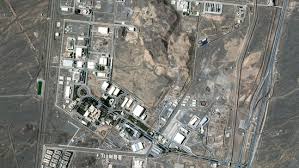

Satellite imagery reveals the aftermath of a targeted strike on the Fordow underground complex near Qom, Iran, highlighting the extent of damage to the nuclear facility.
Washington/Tel Aviv/Istanbul: A preliminary U.S. intelligence assessment suggests that Israel’s recent airstrikes on Iran’s nuclear facilities did not fully dismantle Iran’s nuclear capability, only delaying it by a few months.
Despite claims by President Donald Trump that the strikes had “obliterated” Iran’s nuclear program, sources indicate that Iran’s enriched uranium stocks remain largely intact, and much of the underground infrastructure was unaffected.
The conflict, which involved a 12-day war beginning with Israeli strikes and U.S. involvement, has now entered a fragile ceasefire. Iran and Israel have both signaled the end of hostilities, though tensions persist, and accusations of violations continue. Trump publicly criticized both sides for breaches, emphasizing the importance of maintaining the ceasefire.
Trump’s administration told the United Nations Security Council on Tuesday that its weekend strikes on Iranian nuclear facilities had “degraded” Iran’s nuclear program, short of Trump’s earlier assertion that the facilities had been “obliterated.”
Israeli Prime Minister Benjamin Netanyahu said on Tuesday that the attack on Iran had removed the threat of nuclear annihilation and was determined to thwart any attempt by Tehran to revive its weapons program.
“We have removed two immediate existential threats to us: the threat of nuclear annihilation and the threat of annihilation by 20,000 ballistic missiles,” Netanyahu said.
Iranian President Masoud Pezeshkian said his country had successfully ended the war in what he called a “great victory,” according to Iranian media. Pezeshkian also told Saudi Crown Prince Mohammed bin Salman that Tehran was ready to resolve differences with the U.S., according to official news agency IRNA.
Israel launched the surprise air war on June 13, attacking Iranian nuclear facilities and killing top military commanders in the worst blow to the Islamic Republic since the 1980s war with Iraq.
Iran, which denies trying to build nuclear weapons, retaliated with barrages of missiles on Israeli military sites and cities.
Casualty figures report over 600 deaths in Iran and 28 in Israel. Both nations have now begun reopening airspace and civilian activities.
Despite the ceasefire, military Oil prices plunged and stock markets rallied worldwide in a sign of confidence inspired by the ceasefire, which allayed fears of disruption to critical oil supplies from the Gulf.on both sides warn that the conflict is not over, with Iran vowing to learn from recent blows and continue resistance.
President Trump, who brokered the ceasefire with Netanyahu, expressed frustration over violations, especially criticizing Israel for escalating attacks shortly after agreeing to the truce. The situation remains tense, with both sides cautious about maintaining peace amid deep mistrust.






